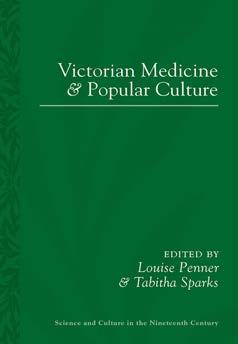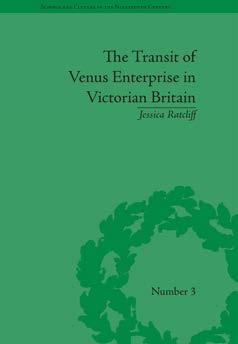
3 minute read
RACE, GENDER & EQUALITY
By Claire L. Jones Series: Science & Culture in the Nineteenth Century Connects medicine and commerce by examining historical medical trade catalogues.
By the late nineteenth century, advances in medical knowledge, technology and pharmaceuticals led to the development of a thriving commercial industry. The medical trade catalogue became one of the most important means of promoting the latest tools and techniques to practitioners. Drawing on over 400 catalogues produced between 1870 and 1914, Jones presents a study of the changing nature of medical professionalism.
Advertisement
University of Pittsburgh Press • 9780822966388 • New in Paperback 229 x 152mm • 280 pages • December 2020 • £26.50
Victorian Medicine and Popular Culture
Edited by Louise Penner and Tabitha Sparks Series: Science & Culture in the Nineteenth Century An interdisciplinary study on the impact of scientific medicine on Victorian culture.

This collection of essays explores the rise of scientific medicine and its impact on Victorian popular culture. Chapters include an examination of Charles Dickens’s involvement with hospital funding, concerns over milk purity and the theatrical portrayal of drug addiction, plus a whole section devoted to the representation of medicine in crime fiction. This is an interdisciplinary study involving public health, cultural studies, the history of medicine, literature and the theatre, providing new insights into Victorian culture and society.
University of Pittsburgh Press • 9780822966432 New in Paperback 229 x 152mm • 200 pages • December 2020 • £26.50
The Age of Scientific Naturalism
Tyndall and His Contemporaries Edited by Bernard Lightman and Michael S. Reidy Series: Science & Culture in the Nineteenth Century

Examines how John Tyndall and his correspondents developed their ideas through writings.
Physicist John Tyndall and his contemporaries were at the forefront of developing the cosmology of scientific naturalism during the Victorian period. They rejected all but physical laws as having any impact on the operations of human life and the universe. Contributors focus on the way Tyndall and his correspondents developed their ideas through letters, periodicals and scientific journals and challenge previously held assumptions about who gained authority, and how they attained and defended their position within the scientific community.
By Jessica Ratcliff Series: Science & Culture in the Nineteenth Century Explores the nature of 'big science' in Victorian Britain

In the nineteenth century, the British Government spent money measuring the distance between the earth and the sun using observations of the transit of Venus. This book presents a narrative of the two Victorian transit programmes. It draws out their cultural significance and explores the nature of "big science" in late-Victorian Britain.
University of Pittsburgh Press • 9780822966449 • New in Paperback 229 x 152mm • 232 pages • December 2020 • £26.50
The Science of History in Victorian Britain
Tyndall and His Contemporaries By Ian Hesketh Series: Sci & Culture in the Nineteenth Century

Draws on a variety of sources to challenge the notion of a single scientific approach to history.
New attitudes towards history in nineteenth-century Britain saw a rejection of romantic, literary techniques in favour of a professionalised, scientific methodology. The development of history as a scientific discipline was undertaken by several key historians of the Victorian period, influenced by German scientific history and British natural philosophy. This study examines parallels between the professionalisation of both history and science at the time, which have previously been overlooked.
University of Pittsburgh Press • 9780822966364 • New in Paperback 229 x 152mm • 248 pages • December 2020 • £26.50
Recreating Newton
Newtonian Biography and the Making of Nineteenth-Century History of Science

Higgitt examines Isaac Newton's changing legacy during the nineteenth century. She focuses on 1820–1870, a period that saw the creation of the specialised and secularised role of the "scientist." At the same time, researchers gained better access to Newton's archives. These were used both by those who wished to undermine the traditional, idealised depiction of scientific genius and those who felt obliged to defend Newtonian hagiography.







